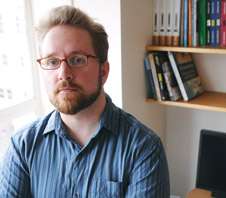Street justice

(�鶹��ԺOrg.com) -- More robberies, muggings and murders take place in low-income neighborhoods where residents lack faith in police, courts and correctional facilities, says criminal justice assistant professor Kevin Drakulich.
He based his conclusions on a National Science Foundation-funded project that included a survey of 6,000 Seattle residents. Drakulich helped complete the study as a PhD candidate at the University of Washington.
According to the study, members of low-income African-American communities in Seattle, distrusting of the criminal justice system, take protection into their own hands and live by a code of street justice based on toughness, respect and pride.
“There is more emphasis on protecting yourself if you don’t have faith in the formal system,” explains Drakulich, whose scholarship focuses on crime and race, including racial profiling.
The unprecedented surge in incarceration across the United States in the last 40 years has been disproportionately concentrated in a relatively small number of already disadvantaged communities, he says. And hyper-aggressive styles of policing don’t help to control crime, and in fact may be doing more harm than good when it comes to safeguarding individuals, families and communities, says Drakulich.
“When parents go to jail, they can’t take care of their kids, and so the children go unsupervised. They can’t bring revenue to their communities,” he says. “When they get released, their human capital is severely reduced, their chances of marrying are severely reduced.”
Rebuilding those communities that have been hit hardest by crime begins with increasing access to jobs and social service programs, Drakulich says.
But it may also require changing the minds of people whose skewed views on crime have perpetuated racial segregation. According to the NSF-funded study, Seattle residents overestimate crime in African-American communities.
“People are relying on stereotypes to believe there is more crime than there actually is,” he says. “And they’re avoiding the source of their fears by not having any contact with residents of other races.”
Drakulich became interested in criminological research on race and class as an undergraduate at Skidmore College, where he helped a professor evaluate the effectiveness of the Vermont Restorative Justice Program. The community-based initiative aims, in part, to help children address problems of underage drinking and petty theft.
Years later, he’s shedding light on the racial and class disparities among prisoners in the country’s correctional facilities, as well as the impact of policing styles on crime levels.
“If we can better understand exactly how community social processes either facilitate or deter crime, we can design more effective policies to help the most troubled communities,” Drakulich says.
Provided by Northeastern University
















